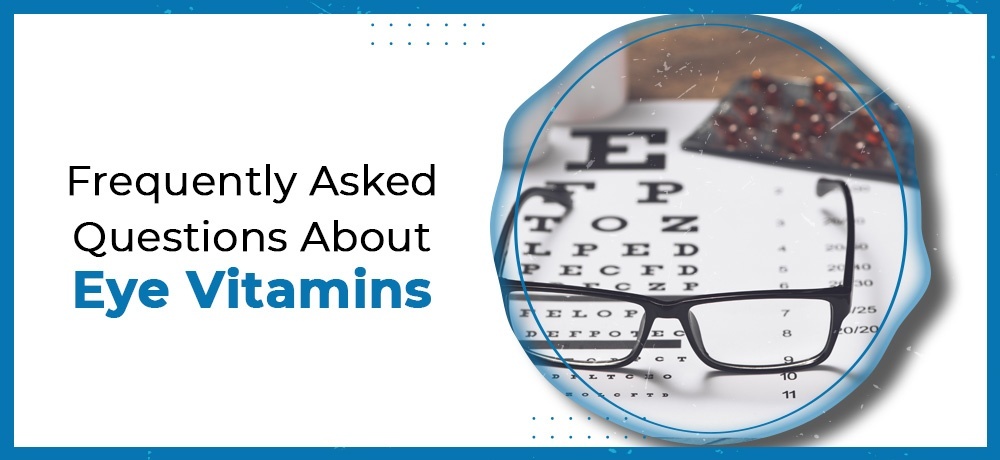Frequently Asked Questions About Eye Vitamins

These days, with people spending increased amounts of time in front of computers, TV, and smartphone screens, eye problems are on the rise. To improve their declining eyesight, individuals are turning to vitamins. However, when it comes to eye vitamins, patients have many questions and often find it tricky to get all the answers they’re seeking.
Doctors Eyecare Wetaskiwin wants to arm you with the most accurate information available to help you take care of your eyes. To do this, we’ve answered some of the most frequently asked questions about eye vitamins.
1. Should I take vitamins for my eyes?
Most healthy people get enough vitamins from their diet. If you have been diagnosed with macular degeneration (AMD) or dry eyes, you should take vitamin supplements. Similarly, if you have a history of macular degeneration in your family, you may want to consider taking vitamin supplements for your eyes.
2. What kind of vitamin supplements should I take if I have macular degeneration?
The Age-Related Eye Disease Study 2 (AREDS2), sponsored by the National Institute of Health (NIH), showed that supplementation with certain micronutrients reduces the progression of dry macular degeneration. The advanced stage of macular degeneration causes severe vision loss.
3. What vitamins does the AREDS 2 formulation contain?
The AREDS2 formula contains:
Lutein 10 milligrams (mg)
Zeaxanthin 2 mg
Vitamin C 500mg
Vitamin E 400IU
Zinc oxide 80 mg or 25 mg (these two doses worked equally well)
Cupric oxide 2mg
4. There is some recent controversy regarding Zinc. Should I be taking Zinc if I have macular degeneration?
Some patients do better with Zinc, and others do worse when taking Zinc. The only way to know for sure is to have a DNA test done to determine which gene you have, the gene that does better with Zinc, or the gene that should avoid Zinc. This DNA test involves taking a cheek swab which is sent away for analysis. Give us a call if you are interested in having the DNA test done.
5. What are Lutein and Zeaxanthin?
Beta Carotene, Lutein, and Zeaxanthin are all specific types of Phytochemicals (micronutrients from plants) called Carotenoids, which are structurally related to Vitamin A. Our bodies do not make these. Plants make them, in part to serve as antioxidants that protect them from potentially harmful sunlight.
When we eat Lutein and Zeaxanthin, they get transported to the retina, where they protect against light-induced damage. There’s usually enough Lutein and Zeaxanthin in the Macula, the central part of the retina, to turn this part yellow. The full name of the Macula is Macula Lutea, which means yellow spot.
6. Should I take eye vitamin supplements if I have a family history of macular degeneration?
Family members of people with macular degeneration often ask whether they should take AREDS2 vitamins or Lutein and Zeaxanthin. While these are safe to take over a period of at least five years (according to the duration of the AREDS2 study), it’s not known whether it would be safe for several decades.
Therefore, family members are recommended to eat foods containing high levels of Lutein and Zeaxanthin rather than take supplements. These foods also have hundreds of other Phytochemicals that are likely to be helpful.
Foods including egg yolk (go easy due to cholesterol), yellow corn, orange and yellow peppers, kale, broccoli, spinach, kiwi, grapes, zucchini, and squash have high levels of Lutein and Zeaxanthin, which are known to be protective against AMD.
7. Are there any supplements that help with dry eye symptoms?
Omega-3 fatty acids are proven to help improve the quality of tears and reduce dry eye symptoms.
If you have any more questions about eye vitamins and supplements, get in touch with the experts at Doctors Eyecare Wetaskiwin. As leading optometrists in Wetaskiwin, AB, we provide a full range of eye health services to patients of all ages, from children to seniors. We also offer sunglasses, contact lenses, and eye exams to our patients. Our services are available to patients across Wetaskiwin, Millet, Maskwacis, Pigeon Lake, and the surrounding areas.
To learn more about how we can help you, please click here or contact us by clicking here.